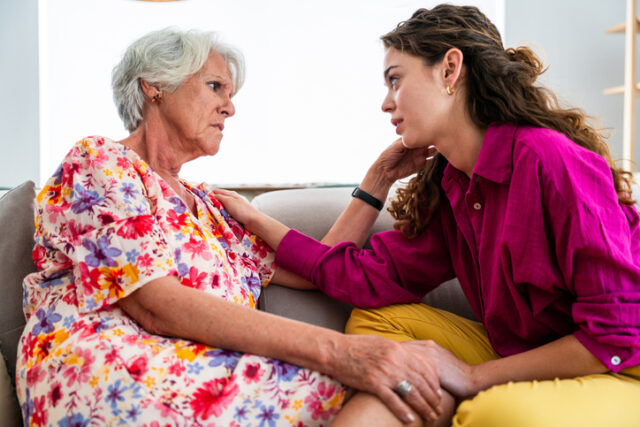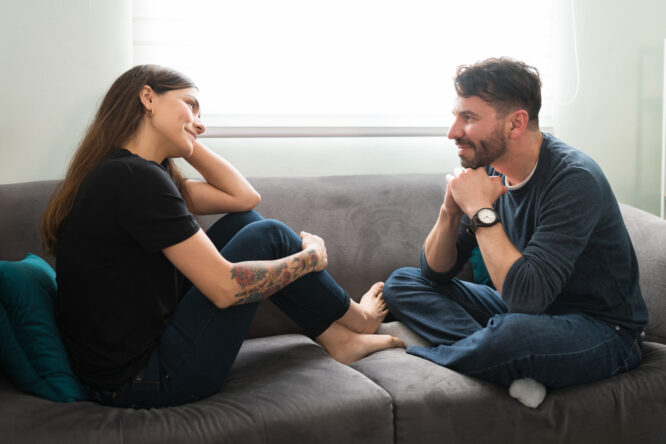When you grow up having to support, soothe, or manage your parent’s emotions, you don’t get to just be a regular kid.

You become the caretaker, the stabiliser, the one who holds it all together. Needless to say, that changes you, often in ways that are invisible to anyone else. Nevertheless, the experience shapes everything from your relationships to how you treat yourself. Here are the traits people tend to develop when they’ve had to emotionally parent their own parents.
1. Hyper-awareness of everyone’s moods

You notice when someone’s tone changes. You pick up on tension in the room before anyone says a word. You’re constantly scanning, checking, adjusting because you learned that emotional storms don’t always come with a warning. Your vigilance isn’t just habit—it was your survival strategy. Even now, all these years later, it’s hard to turn off, even when you’re safe.
2. Deep discomfort with expressing your own needs

When you’re raised to prioritise someone else’s emotional state, your own needs get labelled as “too much” or “bad timing.” As time goes on, it doesn’t feel worth the effort, or the guilt that follows. You might even convince yourself you don’t have needs. They’re still there, though, under the surface, quietly waiting to be acknowledged.
3. A tendency to over-function in relationships

You become the one who remembers everything, organises everything, checks in first. You hold the emotional glue. You become reliable because you had to be. However, sometimes, it’s less about love and more about fear. You overdo to avoid being abandoned or blamed. People rarely realise how heavy that role feels for you.
4. A strong internal voice that says, “Don’t make it worse”

Instead of expressing when you’re hurt, asking for help, or reacting naturally, you hesitate. You soften. You try not to add pressure. You learned early on that your emotions could tip things over, so now you filter everything through that old warning. This makes you appear easygoing or calm. Of course, underneath, it’s often anxiety and learned self-silencing.
5. The instinct to fix other people’s problems immediately

You don’t wait to be asked. If someone’s upset, you’re already soothing. Already offering solutions. Already trying to make it better before it spills into something messy. Helping is second nature, but sometimes it crosses into self-erasure. You forget that not every emotion is yours to manage. Not every problem is yours to solve.
6. Feeling safest in chaos you can control

You might say you want peace, but part of you is only relaxed when you’re actively managing a situation. Chaos that’s predictable or familiar feels easier to handle than stillness, which can feel eerie or unsafe. This isn’t dysfunction; it’s conditioning. You learned to stay alert, to anticipate, to organise other people’s storms. Calm wasn’t always safe. So now, chaos gives you a strange kind of purpose.
7. Difficulty trusting emotional support from other people

Even when someone offers kindness, you brace. You’re used to emotional care coming with strings attached, or disappearing when you need it most. So you either don’t believe it, or you push it away to protect yourself. You’re not cold, you’re cautious. Receiving support feels unfamiliar, and that unfamiliarity can feel more threatening than just doing it all alone.
8. Feeling guilty when you’re not “useful”

If you’re not helping, fixing, supporting, or emotionally holding space for someone, you feel uneasy. Like you’re not doing enough. Like you’ve lost your worth. This is one of the most exhausting legacies of emotionally parenting your parent. You internalised the belief that being loved means being helpful, and rest feels like neglect.
9. Over-explaining yourself, even when it’s not needed

You grew up having to justify your choices, your emotions, even your existence sometimes. So now, you explain everything in case someone misunderstands you, or thinks you’ve done something wrong. This habit comes from walking on emotional eggshells. You still feel like you have to earn your space with context, disclaimers, or proof that you meant well.
10. Avoiding vulnerability until it leaks out sideways

You can hold it together like a pro, but only until it gets too full. Then it spills out in unexpected ways: irritability, withdrawal, sudden overwhelm. You’re not trying to be distant; you’ve just never had a safe outlet. Letting other people in feels scary. So, you carry it all until you can’t anymore—and even then, you apologise for the mess.
11. Extreme independence that can feel isolating

You’re proud of how self-sufficient you are. You can handle anything. You rarely ask for help. However, sometimes, that independence becomes a wall. You don’t let anyone in—not because you don’t want connection, but because you don’t believe you’re allowed to rely on anyone. That kind of strength looks admirable, but it often hides loneliness and exhaustion underneath.
12. Confusing emotional intensity with intimacy

If you grew up in a household where love was tangled with crisis or emotional extremes, you may now associate deep connection with dramatic highs and lows. Calm relationships might feel boring or fake to you. That doesn’t mean you’re broken—it means your emotional baseline got set in chaos. Learning to trust steadiness takes time, but it’s worth unlearning the rollercoaster.
13. Struggling to recognise when you’re the one who needs care

You’re so used to scanning for what everyone else needs that you overlook yourself. Even when you’re exhausted or hurting, your default is to keep going, keep giving, keep proving you’re okay. Sometimes the biggest change isn’t learning how to care for other people—it’s realising you deserve the same kind of care you’ve been giving out for years. Without conditions. Without being “useful.” Just because you’re human, too.




